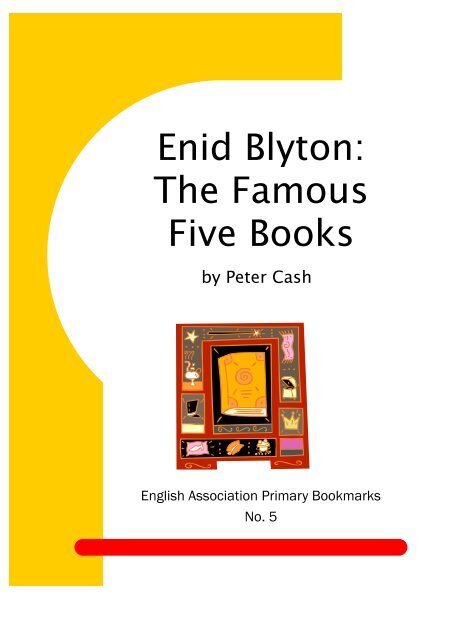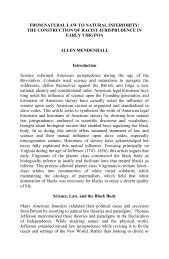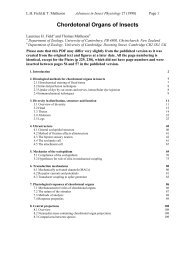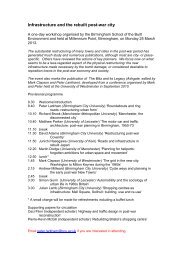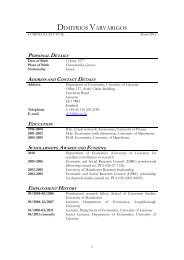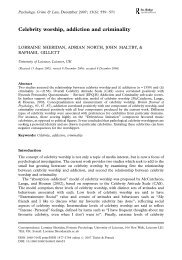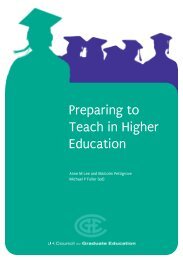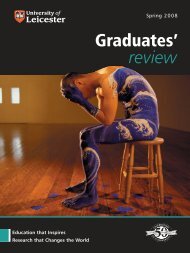Enid Blyton: The Famous Five Books - University of Leicester
Enid Blyton: The Famous Five Books - University of Leicester
Enid Blyton: The Famous Five Books - University of Leicester
You also want an ePaper? Increase the reach of your titles
YUMPU automatically turns print PDFs into web optimized ePapers that Google loves.
<strong>Enid</strong> <strong>Blyton</strong>:<strong>The</strong> <strong>Famous</strong><strong>Five</strong> <strong>Books</strong>by Peter CashEnglish Association Primary BookmarksNo. 5
English Association Primary Bookmarks Number 5<strong>Enid</strong> <strong>Blyton</strong> (1897-1968)THE FAMOUS FIVE BOOKS (1942-1963)byPeter CashBIBLIOGRAPHYSee Appendix AAll 21 books were originally published by Hodder & Stoughton LimitedBIOGRAPHYBarbara Stoney, <strong>Enid</strong> <strong>Blyton</strong>: <strong>The</strong> Biography, 1974George Greenfield, <strong>Enid</strong> <strong>Blyton</strong>, 1998‘QUEER’: THE VOCABULARY OF ENID BLYTONPersonal IntroductionIt smelt queer.No 1 <strong>Five</strong> on a Treasure Island (1942)Chapter Eight Exploring the WreckIt was a queer feeling.No 7 <strong>Five</strong> Go Off to Camp (1948)Chapter <strong>Five</strong> Back at Camp Again“Queer,” said Dick.No 15 <strong>Five</strong> on a Secret Trail (1956)Chapter Sixteen <strong>The</strong> Secret Way“Queer, isn’t it?”No 17 <strong>Five</strong> Get into a Fix (1958)Chapter Twelve Out on the HillsFifty years ago, I was an avid reader <strong>of</strong> <strong>Enid</strong> <strong>Blyton</strong>’s <strong>Famous</strong> <strong>Five</strong> books. I was introducedto these books at Primary School where, one summer term, my teacher decided to concludeeach day by reading us a chapter <strong>of</strong> <strong>Five</strong> on Kirrin Island Again, the sixth title in the 21-book series. What I cannot do is pinpoint the precise year <strong>of</strong> the decade (1950s) in which wesat listening; what I can say is that, since this title was first published in 1947, our teacherwas not exactly at the cutting edge <strong>of</strong> Primary Education, for the book – a hardback, <strong>of</strong>course – had been available for at least ten years.What I next remember is a Christmas gift <strong>of</strong> <strong>Five</strong> Go Adventuring Again, the second titlein the series. I know: no logic here, no concern for a chronological order .... in those days,not long after War-time rationing had ended, people in Skegness bought what was on theshelves. Every Saturday afternoon, my mother would take me shopping with her and, inresponse to my pestering, traipse finally into Dutton’s on Lumley Road where she would forkout 7s 6d for the next book, selected usually by virtue <strong>of</strong> its dust-jacket. In this haphazardway, I built up my library <strong>of</strong> <strong>Famous</strong> <strong>Five</strong>s until, by the time that I was at Grammar School, Ihad read all <strong>of</strong> the twenty books, purchasing seventeen <strong>of</strong> them. <strong>The</strong> last <strong>of</strong> the books – No21 <strong>Five</strong> Are Together Again – did not appear until 1963 by which time I had turnedthirteen and grown out <strong>of</strong> them ....© Peter Cash and <strong>The</strong> English Association 2013 1
English Association Primary Bookmarks Number 5.... or so I thought. This summer, I set out suddenly to complete my collection and foundmyself able via e-bay to acquire the four hardbacks which were not already preserved in lineat the bottom <strong>of</strong> my bookcase – the three which I had borrowed from other children (No 6,No 14 and No 16) and that final one which I had never got around to reading, No 21. Forreasons to which I shall come in my conclusion, I decided then that I would re-read theentire series, subjecting the books to critical analysis in an endeavour to discover why theyhad captivated me in my childhood.What was certain was that these children <strong>of</strong> my own age, living somewhere in the mysteriousand superior south <strong>of</strong> England, in Buckinghamshire or in Dorset, were having exciting times:in fact, Julian, Dick, Anne, George and her mongrel dog Timmy were having an exciting timeevery time that there was a school holiday. Indeed, careful students <strong>of</strong> the series will noticethat the children (who do not age 1 ) enjoy more adventures than they would have had schoolholidays! Superficial analysis <strong>of</strong> the <strong>Famous</strong> <strong>Five</strong> series is always quick to suggest that itsprimary appeal lies in the independence which the <strong>Five</strong> enjoy: in their adventures, they go‘away on their own’ (No 5) and experience that freedom from parental control <strong>of</strong> which allchildren dream. In No 5 <strong>Five</strong> Go Off in a Caravan and No 19 <strong>Five</strong> Go to Demon’sRocks, they are allowed to go <strong>of</strong>f on their own to an extent that today would contravene theChild Protection Act (1999) and interest Social Services. What is more, they proceed alwaysto demonstrate that they are worthy <strong>of</strong> this freedom by means <strong>of</strong> accomplishments at whichthe adults – including deferential policemen – can only marvel. In the <strong>Famous</strong> <strong>Five</strong> books,<strong>Enid</strong> <strong>Blyton</strong> is nothing if not a formulaic writer. For showing to slower-witted adults that the<strong>Five</strong> are quite capable <strong>of</strong> handling their freedom, her formula is the discovery <strong>of</strong> a hiddentunnel: indeed, No 14 <strong>Five</strong> Have Plenty <strong>of</strong> Fun and No 21 <strong>Five</strong> Are Together Again arethe only books in the series which do not feature the sensational discovery and thesubsequent exploration <strong>of</strong> a subterranean passageway; in every one <strong>of</strong> the other nineteenbooks, they go underground, <strong>of</strong>ten following a ‘secret way’. <strong>The</strong>y disarm the threat to thestatus quo without fail. Because they are such virtuous children, their successes in doing soare rewards enough in themselves.<strong>Famous</strong> FoodIn 1982, Channel 4 produced a famous satire on the <strong>Famous</strong> <strong>Five</strong> books, entitled <strong>Five</strong> GoMad in Dorset. That <strong>Blyton</strong>’s series could be subjected to such a treatment says a verygreat deal for its enduring appeal, especially since that final title had come out all <strong>of</strong> nineteenyears earlier. Inadvertently, this satire got its teeth into an unheralded source <strong>of</strong> the <strong>Five</strong>’sappeal – one which I too would certainly have overlooked if I had not spent thirty years as anEnglish teacher responsible for marking 11+ Entrance Exams. Marking hundreds <strong>of</strong>compositions by children <strong>of</strong> this age, I could not help but notice how many <strong>of</strong> them, whenthey were either stuck for something to say or searching for a satisfying ending, described ameal: they would stop for lunch or go home and have tea. It’s the same with <strong>Enid</strong> <strong>Blyton</strong>:when her narrative stalls, one <strong>of</strong> the children (usually Dick) will declare that he is hungry – atwhich point will follow a bill <strong>of</strong> fare from the 1940s and 1950s. None <strong>of</strong> the narratives ismore <strong>of</strong>ten rescued by this strategy than No 15 <strong>Five</strong> on a Secret Trail.In <strong>Five</strong> Go Mad in Dorset, the menu is <strong>of</strong> ‘ham and turkey sandwiches, bags <strong>of</strong> lettuce,hard-boiled eggs, heaps <strong>of</strong> tomato, and lashings <strong>of</strong> ginger beer’. As the Wikipedia entryadmits, the catch-phrase ‘lashings <strong>of</strong> ginger beer’ (by which <strong>Famous</strong> <strong>Five</strong> antics have beensubsequently characterised) appears nowhere in <strong>Blyton</strong>’s <strong>Famous</strong> <strong>Five</strong> books; the phrase isnot hers. Although the children think that ginger-beer is ‘a gorgeous drink’ and consume itwith ‘everything’, the particular measures are never ‘lashings’. This locution, when it is used,is used only very sparingly: in No 11 <strong>Five</strong> Have a Wonderful Time, set in a travelling‘fair’/circus, Dick (Chapter 3) does not fancy having to contend with ‘lashings <strong>of</strong> poisonoussnakes’; in No 12 <strong>Five</strong> Go Down to the Sea, Dick again (Chapter 2) salivates after1 In No 1, published in 1942, Julian is twelve, Dick and George are both eleven and Anne is ten; in No 3 <strong>Five</strong> RunAway Together, published in 1944, they are all one year older; eventually, <strong>Blyton</strong> stops counting – not least, onesupposes, because by 1963 Timmy would have lived far longer than any dog in history.© Peter Cash and <strong>The</strong> English Association 2013 2
English Association Primary Bookmarks Number 5‘lashings <strong>of</strong> hard-boiled eggs’ and <strong>Blyton</strong> herself puts the coinage in inverted commas(Chapter 5) in order to jest at a feast <strong>of</strong> ‘peas and new potatoes’; in No 20 <strong>Five</strong> Have aMystery to Solve, she likewise appropriates Dick’s idiom for her own description <strong>of</strong> a mealand refers to ‘lashings <strong>of</strong> treacle’ (Chapter 2). Of course, the echo which catches the satirist’sear is <strong>of</strong> boarding school slang from the 1950s: in that lost world, ‘old’ (as applied to theyoung!) is a repetitive term <strong>of</strong> endearment, a great many people and things are ‘jolly decent’and the well-bred children are always grateful for what they are about to receive. Wherefood is concerned, the C4 scriptwriters mock their hearty appetites for salads which are notappetising: in No 7, “Spam and lettuce” sandwiches (Chapter 2); in No 11, “two hard-boiledeggs each, fresh lettuce, tomatoes, mustard and cress, and potatoes baked ... in theirjackets” (Chapter 7); in No 12, “Lettuce, tomatoes, onions, radishes, mustard and cress,carrot grated up” (Chapter 2). Yummy! Because they are in the 1950s, the children alsoopen a lot <strong>of</strong> tins <strong>of</strong> fruit; alternatively, they are somehow able to fill up with either plums orraspberries, <strong>of</strong>ten plentiful in unlikely months <strong>of</strong> the year. So much roughage in their diet!So it’s very amusing to note that the <strong>Five</strong>, the dog included, never need to go to the toilet; nomatter where they camp, Nature never calls. By the time that I was trying to re-visualise thevague setting for No 15 <strong>Five</strong> on a Secret Trail, I was feeling distinctly uncomfortable forthem. Only in No 19 <strong>Five</strong> Go to Demon’s Rocks does Timmy give ‘a little whine’ becausehe is ‘longing for a walk’ (Chapter 12)!StyleI shall not therefore be making special claims for the formulaic plots <strong>of</strong> the books: afterhaving just read the same story twenty-one times, I’m in no mind to do that. 2 No: whatinterests me is the style <strong>of</strong> writing by which <strong>Blyton</strong> carries her narratives. In 1998, <strong>Enid</strong><strong>Blyton</strong>’s agent, George Greenfield, wrote a succinct biography <strong>of</strong> his late client. Chapter <strong>Five</strong>– entitled Style and Content – includes this passage:To apply the strict rules <strong>of</strong> literary criticism to <strong>Enid</strong> <strong>Blyton</strong>’s writingwould be both unfair and absurd. Her forte was telling stories and hertechnique was adapted for that purpose. Her sentences tend to be simpleand straightforward, with very few dependent clauses. <strong>The</strong>re are few adjectivesand those used are the more obvious ones – ‘a hot sunny day’, ‘a short nap’,‘sharp eyes’, ‘poor Margery’ and so on. Much <strong>of</strong> the story development takesplace through dialogue, which contains a liberal peppering <strong>of</strong> exclamation marks ....As I have already announced, applying ‘the rules <strong>of</strong> literary criticism to <strong>Enid</strong> <strong>Blyton</strong>’s writing’is exactly what I want to do – and, indeed, Mr Greenfield himself makes an excellent start.He is right: <strong>Blyton</strong> does not trouble her readers with complex sentences; rarely does asentence begin with a subordinate conjunction; in fact, there are hardly any subordinateconjunctions and their ‘dependent clauses’ to detain us or tax us; there are some semicolons,but they are widely scattered. Instead, one simple sentence after another beginssubject + predicate: “Julian was ....”/“<strong>The</strong>y went ....” Mr Greenfield is also right that there‘there are few adjectives’ – and, he might have added, few colours other than sea-blue andsky-blue. In the main, this is because – except in No 5, No 11 and No 12 – there is littledescriptive writing:She set a scene quickly and then with her short paragraphs and strippeddownsentences kept the characters on the move. <strong>The</strong>re were no pausesfor detailed descriptions <strong>of</strong> the scenery or subtle characterization.Where a scene needs setting, <strong>Blyton</strong> does it briefly and in hackneyed imagery. AlthoughKirrin (the coastal village where George’s parents live) is to be imagined in the vicinity <strong>of</strong>Corfe Castle in Dorset, readers need not bother going to <strong>Blyton</strong> for geographical accuracy andtopographical precision. A primary attraction <strong>of</strong> the <strong>Famous</strong> <strong>Five</strong> books is that their titles2 In No 9 <strong>Five</strong> Fall into Adventure, George is kidnapped and held first in a caravan and then in an old house; inNo 14 <strong>Five</strong> Have Plenty <strong>of</strong> Fun, George is kidnapped and held first in a caravan and then in an old house.© Peter Cash and <strong>The</strong> English Association 2013 3
English Association Primary Bookmarks Number 5been a set text at O-Level/GCSE Level; 4 for the past sixty years, Rodgers and Hammerstein’sSouth Pacific – based on Nellie Forbush’s horrified reaction to Emile DeBecque’s mixed-racechildren – has played to audiences around the world. Robertson’s Jam ceased to trade <strong>of</strong>f itsgolliwog-emblem only in 2001.In the interests <strong>of</strong> balance, it is only fair to observe that the <strong>Famous</strong> <strong>Five</strong> stories are notwithout active sympathy for characters who exist on the margins <strong>of</strong> post-War English society.Even though <strong>Enid</strong> <strong>Blyton</strong>’s ‘fair-folk’/gypsies are illiterate, ill-mannered and unhygienic, theyare good-natured and capable <strong>of</strong> praiseworthy deeds. Both Nobby (No 5) and Sniffer (No 13)exhibit fortitude and resourcefulness; both Yan (the ‘queer little boy’ in No 12) and Aily (the‘queer little thing’ in No 17) are ‘forlorn little waifs’/‘rapscallions’ whose helpfulness andresilience command similar admiration. Above all, Jo – the ‘ragamuffin’ whom the <strong>Five</strong>befriend in three <strong>of</strong> the books – is remarkable for her agility and her heroic ‘pluck’. Latterly,<strong>Blyton</strong>’s coastal county is nothing if not a country for old men: throughout the 21 books, oldpeople, far from being marginalised, are treated with all due respect, revered, venerated aswise elders. In No 2, the four children visit Old Mr and Mrs Sanders; in No 7, the childrenhumour Mr Luffy, an ‘elderly’ teacher; in No 8, they are generous to Aggie, ‘a poor,miserable, scared old woman’; in No 12, they approach Yan’s Grandad [sic] with solicitude; inNo 13, they consult Old Ben; in No 16, they are kind to Old Mrs Janes; 5 and in No 17, theyare nice to Old Mrs Jones and Mrs Thomas. In No 18, they are in awe <strong>of</strong> Great Grand-dadPhilpot; in No 19, they turn to Jeremiah Boogle; and in No 20, they help out Mrs Layman.Cruelties to animals, including chimpanzees, are sure signs <strong>of</strong> vice; in four successive books,Mr Roland, Mrs Stick, Block and Tiger Dan are hostile to Timmy. Conversely, kindnesses toanimals, especially to dogs called Timmy, form an infallible index <strong>of</strong> human virtue<strong>The</strong> accusation that <strong>Enid</strong> <strong>Blyton</strong>’s fiction is not only racist, but also sexist stems from hergender-stereotyping. In the <strong>Famous</strong> <strong>Five</strong> series, this charge centres upon Anne who loves topack, shop, cook, wash up and tidy up: according to her brothers, she is ‘a good little housewife(No 3, Chapter 14), ‘a very good little housekeeper’ (No 5, Chapter 5), ‘a very good littlehousewife’ (No 7, Chapter 3), a ‘proper little housewife’ (No 8, Chapter 3), ‘a jolly goodhousekeeper’ (No 11, Chapter 7) and ‘a real home-maker’ (No 20, Chapter 6). After No 1<strong>Five</strong> on a Treasure Island, <strong>Blyton</strong> reminds us twenty times that Georgina – with her ‘shortcurly hair’ and ‘boyish ways’ – wants to be George because being a girl isn’t worth it: “ “It’sstupid being a girl,” said George, for about the millionth time in her life” (No 10 <strong>Five</strong> on aHike Together, Chapter 4). Primarily, this is because a girl, as embodied by the petite and‘domesticated’ Anne, is not robust enough to enjoy adventures. In view <strong>of</strong> this charge, theamount <strong>of</strong> attention that <strong>Blyton</strong> pays to Anne is interesting.A consistent feature <strong>of</strong> each book is the scrupulous way in which <strong>Blyton</strong> marshals her maincharacters. Forensic analysis reveals how shared the dialogue is between the four children:in each book, she is concerned to distribute speeches evenly between them, to organise forthem equal contributions to the numerous conversations. Here, <strong>of</strong> course, is <strong>Enid</strong> <strong>Blyton</strong> thequalified school teacher who includes each and every child/leaves no child out. For Anne, theconsequence <strong>of</strong> this egalitarian approach is that she is always given her fair say.In No 6 <strong>Five</strong> on Kirrin Island Again, Anne says: “It would have been wizard to go andstay on the island these holls” (Chapter 1). We are reminded that <strong>Blyton</strong>’s daughters – Gillianand Imogen, name-checked on the title-page – both attended Benenden School in Kent in the1940s, for here (see my italics) is the class-ridden vocabulary <strong>of</strong> the public school to whichanother kind <strong>of</strong> egalitarian objects. Listen, however, to the way in which <strong>Blyton</strong> presentsGeorge’s reply to Anne’s subsequent suggestion:“As if living on Kirrin Island with Father there would be the sameas living there all by ourselves,” said George, scornfully.4 Furthermore, there are 15 vituperative uses <strong>of</strong> this epithet in John Steinbeck’s Of Mice and Men (1937) – a textwhich is never <strong>of</strong>f the GCSE syllabus.5 See Appendix C.© Peter Cash and <strong>The</strong> English Association 2013 5
English Association Primary Bookmarks Number 5After the unnecessary comma, <strong>Blyton</strong> introduces her child-readers to the concept <strong>of</strong> scorn: inreply, George is disdainful and judgemental, sc<strong>of</strong>fing at her cousin for being bothfemale/feminine and younger. <strong>The</strong> literary value <strong>of</strong> such retorts is that they oblige readers tore-examine their own values. <strong>The</strong>y demand that readers think ....In the <strong>Famous</strong> <strong>Five</strong> series, Anne, more than any other character, is the victim <strong>of</strong> sexiststereotyping. It is therefore strange that <strong>Blyton</strong> receives so little credit for creating in Georgea character who rebels against her gender-stereotype with a fierce consistency. I know that Inever read this telling-<strong>of</strong>f (from 1951) as a political attempt to put Georgina in hersubordinate place:“You know quite well that if ever you go against the orders <strong>of</strong> the chief –that’s me, my girl, in case you didn’t know it – you won’t come out withus again. You may look like a boy and behave like a boy, but you’re a girlall the same. And like it or not, girls have got to be taken care <strong>of</strong>.”No 10 <strong>Five</strong> on a Hike Together Chapter 4Here, Julian is pulling male rank expressly in order to protect his ebullient cousin. I thoughtthat, in spite <strong>of</strong> his patronising epithet (‘my girl’) and his hectoring tone, he was just beinggallant: as an older boy, responsible for the hike, such gallantry is merely what he expected<strong>of</strong> himself. He sees himself – as I saw him – as simply doing a ‘decent’ thing. Eleven yearslater, Dick presents George in a worse light:“George ought to help more. She’s a girl like you – but she never getsthe meals or anything. I’ll tick her <strong>of</strong>f one <strong>of</strong> these days.”No 20 <strong>Five</strong> Have a Mystery to Solve Chapter 8In Dick’s opinion, her place is in the kitchen. <strong>Blyton</strong>, however, is quick to demonstrate thatwe should be grateful for female contentment in that place by an equalising and unusuallywitty gender-stereotyping <strong>of</strong> ‘ham-handed’ boys. Dick’s hubristic boast that he is adept athandling crockery meets its immediate nemesis in a dropped and broken glass. <strong>Blyton</strong>’segalitarian approach to dialogue means that, from the start to the finish <strong>of</strong> the series, Annecomes up with her fair share <strong>of</strong> observant remarks and intelligent suggestions: “Clever girl”(No 2, Chapter 15) and “Good idea, Anne” (also No 20, Chapter 10). 6Did I, in those days, detect any particular racism or sexism in <strong>Enid</strong> <strong>Blyton</strong>’s stories? Well, Iwouldn’t have done, would I? In 1960, Peter Sellers had a No 5 hit with GoodnessGracious Me – written by Herbert Kretzmer and produced by George Martin; 7 in 1965,Laurence Olivier starred in a film version <strong>of</strong> Othello. Meanwhile, <strong>The</strong> Black and WhiteMinstrel Show (1958-1978) kept running on BBC Television and touring the nation’stheatres. Mainly, <strong>Enid</strong> <strong>Blyton</strong> was read – as I, aged 10/11, read her – as a writer for children<strong>of</strong> her times.If there is an out-dated attitude in the <strong>Famous</strong> <strong>Five</strong> books, one largely out-dated even at thetime <strong>of</strong> writing, then it is <strong>Blyton</strong>’s very casual acceptance <strong>of</strong> corporal punishment. What I dorecall <strong>of</strong> the political incorrectness for which her books were slated can certainly be foundhere. Let me testify:“I love dogs, and I shall be thrilled to have Timmy here. But I dowarn you that if my stepfather ever finds out we shall probably allget a jolly good thrashing, and you’ll be sent home in disgrace.”No 4 <strong>Five</strong> Go to Smuggler’s Top Chapter 56 Questions: Is it sexist to hold open a door for a woman? Is it polite to hold open a door for a lady?7 Does anyone today suggest that we ban Les Miserables and Beatles’ CDs because Kretzmer and Martin oncecollaborated on a song in which an English Jew mocks an Anglo-Indian accent?© Peter Cash and <strong>The</strong> English Association 2013 6
English Association Primary Bookmarks Number 5Here, Pierre Lenoir (with whom the children are staying at Smuggler’s Top) warns them that,if his step-father discovers their disobedience in bringing and hiding the dog, then he will feelperfectly entitled to ‘thrash’ them ‘all’: that is, administer corporal punishment to otherpeople’s children, girls included. Especially in these earlier books, the threat <strong>of</strong> punishmentby hand is always there: in the 1940s and 1950s, both parents and teachers thought that, inorder to bring up children properly, they ought to spank them; such strict discipline was amoral requirement. Consequently, the children expect a ‘spanking’ if they misbehave andthey accept this painful lot as if they deserve it: for instance, Toby Thomas says to his littlebrother Benny, “You wait till Dad hears it – you’ll get such a spanking” (No 16 <strong>Five</strong> Go toBillycock Hill, Chapter 6). In <strong>Blyton</strong>, being hit by ‘grown-ups’ is an occupational hazard <strong>of</strong>childhood. I grew up in Darkest Lincolnshire, but attended there both a primary school and asecondary school at which corporal punishment was no longer administered. So I rememberregarding the <strong>Blyton</strong> chapters which brought up the subject as I regarded episodes <strong>of</strong> BillyBunter (1952-1961) and Whacko! (1956-1960). Both were comedies shown on BBCTelevision in the early evening: where there were references to ‘beating’, ‘licking’, ‘spanking’,‘thrashing’ or ‘whipping’, they must surely be references to bygone days <strong>of</strong> which we couldsafely make fun ....AnomaliesBecause <strong>Enid</strong> <strong>Blyton</strong> was such a prolific author, it was alleged that she did not write all <strong>of</strong> herown books. George Greenfield, her agent for the final fifteen years <strong>of</strong> her life, is an authorityon her method <strong>of</strong> composition and can testify to the speed at which she was able to write. InChapter <strong>Five</strong> <strong>of</strong> his biography, he reports that <strong>Enid</strong> could write a <strong>Famous</strong> <strong>Five</strong> book <strong>of</strong> 45,000words within a week; he works out that she could average 1,500 words per hour. I cannotsay that, as I read – only recently – from one book to the next, I detected any markeddifferences between the hands at work. I do think that, in No 5 <strong>Five</strong> Go Off in a Caravan,the descriptions are fuller and more colourful than they are elsewhere, the paragraphs morecarefully and patiently crafted; I think also that No 20 <strong>Five</strong> Have a Mystery to Solve lacksa certain fluency; but I can nowhere point conclusively to stylistic evidence <strong>of</strong> another author.On the one hand, we should remember that No 1 was written in 1942 and No 21 was finishedin 1963 8 and that <strong>Blyton</strong>, in each one <strong>of</strong> these 21 years, was putting her mind to a hugenumber <strong>of</strong> different books; on the other hand, we should acknowledge that, long before thedecade was over, she had succumbed to Alzheimer’s Disease.If there is a worrying puzzle, then it has to do with the relationship between Julian, Dick andAnne’s parents and George’s parents. Julian, Dick and Anne are George’s cousins, but it isnot clear which two <strong>of</strong> the respective parents are siblings. Anyone who has got as far as thefirst page <strong>of</strong> the first book (<strong>Five</strong> on a Treasure Island) will be wondering what I am talkingabout, for there <strong>Blyton</strong> states categorically <strong>of</strong> Julian, Dick and Anne’s father that ‘Quentin washis brother, the children’s uncle’. For fourteen books, the four children go without asurname. It is not until Chapter 1 <strong>of</strong> No 15 <strong>Five</strong> on a Secret Trail that <strong>Blyton</strong> refers toGeorge’s mother [aka Aunt Fanny] as ‘Mrs Kirrin’. In Chapter 1 <strong>of</strong> No 16 <strong>Five</strong> Go toBillycock Hill, <strong>Blyton</strong> confirms that Uncle Quentin is ‘Mr Kirrin’ and Aunt Fanny ‘Mrs Kirrin’;in Chapter 5 <strong>of</strong> this book, Toby Thomas introduces his friends to Mr Gringle as “Julian Kirrin,Dick Kirrin, Anne Kirrin, George Kirrin their cousin ....”; this, <strong>of</strong> course, is consistent with theoriginal statement that Julian, Dick and Anne’s father is Uncle Quentin’s brother. But it is notconsistent with Chapter 1 <strong>of</strong> No 17 <strong>Five</strong> Get into a Fix in which Dr Drew enters a room(where the four children are coughing) ‘with the mother <strong>of</strong> Julian, Dick and Anne’:“Will they be well enough to go to school, Doctor?” asked Mrs Barnard anxiously.8 Even when she is writing in 1963, <strong>Blyton</strong> imagines children’s lives as if it were still 1942 – albeit without anyintrusions from the Second World War. Only once (No 6, 1947) do the four children watch television. Only once (No16, 1957) do they listen to music: in Chapter 10, Anne precociously looks forward to a radio-broadcast <strong>of</strong>Beethoven’s Pastoral Symphony.© Peter Cash and <strong>The</strong> English Association 2013 7
English Association Primary Bookmarks Number 5Here, Uncle Quentin’s brother’s wife is not another Mrs Kirrin (as she ought to be) but MrsBarnard. Now, the family surname is Barnard. Oh no, it isn’t! In Chapter 2 <strong>of</strong> No 18 <strong>Five</strong>on Finniston Farm, the Philpot twins announce the arrival <strong>of</strong> ‘the Kirrins’. Likewise, Chapter1 <strong>of</strong> No 19 <strong>Five</strong> Go to Demon’s Rocks reverts in its opening line to the styling <strong>of</strong> No 15and No 16:“Fanny!” shouted Mr Kirrin, running up the stairs with a letter in his hand.Once again, Uncle Quentin is Mr Kirrin and Aunt Fanny (when she speaks) is Mrs Kirrin; in No21 <strong>Five</strong> Are Together Again, Aunt Fanny remains ‘Mrs Kirrin’. I know: you wait fifteenyears for a surname and then two come along at once. What is more, the first surname,though it may be more familiar and logical, is the worse choice, for it is Fanny, whosesurname would have changed on marriage, who has lived in Kirrin ‘all her life’ and whooriginally owned Kirrin Island. Of course, the four children would also be cousins if Julian,Dick and Anne were the children <strong>of</strong> Aunt Fanny’s sister, presumably married to a Mr Barnard– and that, to confuse the matter further, is exactly what <strong>Blyton</strong> implies when, on the firstpage <strong>of</strong> No 8 <strong>Five</strong> Get into Trouble, Uncle Quentin protests that he can never remember ifthe four children “are going to be here with us or with your sister.” Chaos, <strong>Enid</strong>: couldn’t youhave been more a little more diligent?In No 20 <strong>Five</strong> Have a Mystery to Solve, there is another puzzling anomaly: whereas in allearlier books (eg. No 5) George has appeared to live some way from her three cousins, inthis book her home at Kirrin Cottage is within cycling distance <strong>of</strong> theirs. Once again, theproblem begins in the first chapter <strong>of</strong> the series: in <strong>Five</strong> on a Treasure Island, <strong>Blyton</strong>describes the car journey that Julian, Dick and Anne take with their parents to the coastalvillage <strong>of</strong> Kirrin where George lives with hers. This journey is ‘to a place they had never beento before’ and it is no quick hop. In fact, the drive – beginning north <strong>of</strong> London – takes thebest part <strong>of</strong> a day: at eleven o’ clock, Anne is hungry, but is told that she must wait ‘till atleast half-past twelve’ for their lunch-time picnic. Indeed, her father estimates that they willarrive in Kirrin ‘about six o’clock’ and he prepares them for ‘another long spell in the car’; it isonly after their ‘tea-time’ picnic that they sight Kirrin Bay. In subsequent books, Kirrin Cottageis a place to which Julian, Dick and Anne travel by train to holiday: in both No 9 and No 15,Julian, Dick and Anne alight at Kirrin Station; in No 14, Anne speaks <strong>of</strong> having arrived in Kirrin‘yesterday’. In short, the two families (Barnards or Kirrins) do not live just around the cornerfrom each other – which is certainly what No 20 suggests.ConclusionIn conclusion, I think that upon retirement a man may naturally start to wonder why hiscareer took the direction that it did and try to make some philosophical sense <strong>of</strong> thatdirection: how did I become the person I became? If he became a teacher <strong>of</strong> English, thenhe can wonder especially what lit that spark: was it when I enjoyed reading No 2 <strong>Five</strong> GoAdventuring Again? If so, how did that happen? What affected me and made an indelibleimpact? I recall that, as a child, I liked No 2, No 3, No 4, No 8, No 10, No 12 and No 17 <strong>of</strong>the <strong>Famous</strong> <strong>Five</strong> series, but that I did not care much for No 14, No 15 and No 16. With theadvantage <strong>of</strong> fifty years’ hindsight, I can see and confirm that No 2 is a ripping yarn. Afterall, Chapter 14 does begin:<strong>The</strong> four children crept downstairs through the dark and silent night.Beat that! <strong>The</strong> clarity and the economy <strong>of</strong> language fully realise the surreptitious activity inwhich the children are together engaged and prepare us for a revelation: “ “Look at that!”said George, in a thrilling whisper.” Once again, <strong>Blyton</strong>’s economical use <strong>of</strong> language swiftlyaccomplishes its aim, celebrating the startling find [= a secret panel] at the same time as itarticulates the need to keep quiet about it. I should hasten to add that No 10 <strong>Five</strong> on aHike Together and No 12 <strong>Five</strong> Go Down to the Sea remain equally atmospheric tales,both excellent books <strong>of</strong> their kind; ironically, in that it was my first contact with the series,only No 6 (Uncle Quentin in that tower on Kirrin Island) now seems to me irredeemably silly –© Peter Cash and <strong>The</strong> English Association 2013 8
English Association Primary Bookmarks Number 5and No 20, as I’ve already said, feels unusually dull and uninspired, altogether a bit <strong>of</strong> astruggle.So was I, as a youngster, simply engaged by <strong>Blyton</strong>’s page-turning technique? First, I lovedthe idea that my own three cousins and I might have such adventures available to us on ourown nearby beaches – though let it be stressed that we would not have kept rushing <strong>of</strong>f to‘bathe’ [= their archaic noun and verb for ‘swim’] in cold English lakes and seas, once in April(No 8) and once in October (No 10)! Second, I was engaged by <strong>Blyton</strong>’s style. It is by nomeans a weakness that her straightforward syntax and her compact vocabulary set up noresistance to the pace at which a ten-year-old wants to follow her narratives. But there issomething else: <strong>Blyton</strong> directs her dialogue with an instinctive skill that keeps childreneverywhere listening closely. First, she fits descriptions (<strong>of</strong> food, <strong>of</strong> physiognomy, <strong>of</strong> terrain,<strong>of</strong> weather) between speeches, but rarely at any great length: how <strong>of</strong>ten do we find anatmospheric or dynamic description that runs longer than three/four sentences without eitheran exclamation (!) or a rhetorical question? Second, she arranges/orchestrates her speakersso harmoniously that, in each book, her ten-year-olds find themselves attentive to acontinuous flow <strong>of</strong> excited, inflected talk: in other words, her readers become at every pointthe audience to an unfolding voice-drama between conflicting tones. Above all, <strong>Enid</strong> <strong>Blyton</strong>ensures that her stories are heard.By far <strong>Enid</strong> <strong>Blyton</strong>’s preferred way <strong>of</strong> acknowledging a speaker is to play safe/be lazy: that is,to use ‘said’ without any adorning adjunct. But there follow significant enhancements: tocomplement her safe style, she develops three ways to indicate the tones <strong>of</strong> her speakersand thereby set up the dramatic harmony between them. Between the <strong>Five</strong>, dog included,the exchanges are tumultuous, setting up emotional resonances – eg. <strong>of</strong> dismay, <strong>of</strong> delight –to which her readers can listen and respond. Nowhere does the sound <strong>of</strong> exchangedspeeches fluctuate more expressively and more rapidly than throughout No 3 <strong>Five</strong> RunAway Together in which a kind <strong>of</strong> vocal ping-pong is audible.<strong>Blyton</strong>’s first way is simply to vary the verb: for ‘said’, there is a vast variety <strong>of</strong> substituteverbswhich includes ‘agreed’, ‘announced’, ‘asked’, ‘begged’, ‘boasted’, ‘boomed’, ‘called’,‘chuckled’, ‘commanded’, ‘cried’ (her favourite option), ‘complained’, ‘demanded’, ‘explained’,‘gasped’, ‘giggled’, ‘grinned’, ‘groaned’, ‘growled’, ‘insisted’, ‘murmured’, ‘muttered’, ‘ordered’,‘promised’, ‘panted’, ‘raged’, ‘rapped out’, ‘remarked’, ‘repeated’, ‘retorted’, ‘shouted’ (anotherfavourite), ‘snapped’, ‘sniffed’, ‘sobbed’, ‘squealed’, ‘stammered’, ‘suggested’, ‘thought’,‘wailed’, ‘warned’, ‘wept’, ‘whispered’, ‘wondered’, ‘yawned’, ‘yelled’. At once, such verbsensure that every <strong>Famous</strong> <strong>Five</strong> adventure unfolds to a sound-track on which the author iscontinually adjusting the volume-control.Her second way is to use a past participle in its adjectival form in order to describe thespeaker’s mood/state <strong>of</strong> mind: for instance, ‘said Julian, disappointed’, ‘said Julian, takenaback’, ‘said Dick, amused’, ‘said Dick, pleased’, ‘said George, irritated’, ‘said George,puzzled’, ‘said Anne, exasperated’, ‘said Anne, worried’. Even in this form, the narrative<strong>of</strong>fers an essentially auditory experience.Her third way is to place adverbs and adverbial phrases <strong>of</strong> manner after ‘said’ in expertlyjudged rotation. In 1949, the author Ge<strong>of</strong>frey Trease (1909-1998) claimed that <strong>Enid</strong> <strong>Blyton</strong>’sstyle was “drained <strong>of</strong> all difficulty until it achieved a kind <strong>of</strong> aesthetic anaemia.” So far, it hasbeen accepted that, to the end <strong>of</strong> the <strong>Famous</strong> <strong>Five</strong> series, <strong>Blyton</strong> constructs her sentenceswithout ambition or sophistication. It has been conceded that her vocabulary remainsrudimentary and (as we have seen) unenlightened by any inklings <strong>of</strong> cultural change: unlessyou count ‘queer’, which I have done, she does not have a way with describing words. Thisbeing so, it is surprising then to discover how <strong>of</strong>ten she adds ‘ly’ to an adjective which sherarely uses in its own right and how <strong>of</strong>ten her adverbs add adult bite to the children’sexchanges. In fact, <strong>Blyton</strong>’s compendium <strong>of</strong> adverbs is quite literally remarkable,encompassing – as it does – a mature range <strong>of</strong> emotional and psychological states.Whenever she wishes to catch a feeling or a thought in a particular tone <strong>of</strong> voice, she puts anadverb <strong>of</strong> manner, regardless <strong>of</strong> any sudden complexity that it may involve. Consequently,© Peter Cash and <strong>The</strong> English Association 2013 9
English Association Primary Bookmarks Number 5one <strong>of</strong> her most common and instructive combinations is ‘said’ + adverb: eg. ‘said George,scornfully’. Throughout the <strong>Famous</strong> <strong>Five</strong> series, her lexicon <strong>of</strong> adverbs 9 is sensitive to a richvariety <strong>of</strong> such intonations and it thereby licenses the case for a strong defence <strong>of</strong> <strong>Blyton</strong>’swriting.<strong>Enid</strong> <strong>Blyton</strong>’s critics will have nodded knowingly and rightly at my calculation that she uses‘queer’ 309 times in 21 books. Who among them, I wonder, will also be expecting to seethat her onomatopoeic verbs and her dramatic adverbs <strong>of</strong>fer her young readers quite such awealth <strong>of</strong> sensations and reflections? <strong>The</strong> critics <strong>of</strong> her ‘anaemic’ vocabulary will expect t<strong>of</strong>ind a recycling <strong>of</strong> trite adverbs: ‘loudly’, ‘s<strong>of</strong>tly’, ‘quickly’, ‘slowly’, ‘coolly’, ‘warmly’, ‘happily’,‘heartily’, ‘joyfully’, ‘politely’, ‘rudely’ and ‘suddenly’ (itself used a grand total <strong>of</strong> 145 times); tobe fair, they may even be pleased to note that ‘indignantly’ (x 39) and ‘scornfully’ (x 43) alsoare used regularly and widely.* But what about ‘airily’, ‘appreciatively’, ‘apologetically’,‘artfully’, ‘beseechingly’, ‘dolefully’, ‘earnestly’, ‘exultantly’, ‘fervently’, ‘genially’, ‘gravely’,‘imperiously’, ‘insolently’, ‘jubilantly’, ‘peevishly’, ‘ponderously’, ‘reproachfully’, ‘ruefully’,‘soberly’, ‘stolidly’, ‘sullenly’, ‘uneasily’ and ‘ungraciously’ – not to mention ‘in a tone <strong>of</strong>amiable surprise’ (No 3), ‘with her usual irritating vagueness’ (No 9) and ‘in awe’? All <strong>of</strong>these adverbs occur/recur in <strong>Enid</strong> <strong>Blyton</strong>’s <strong>Famous</strong> <strong>Five</strong> books. 10Refreshingly, <strong>Blyton</strong>’s strategy is not to confine herself to the same old monosyllables + ‘ly’.<strong>The</strong> result is a vocabulary wide-ranging enough to enlarge/enrich any child’s perception <strong>of</strong>the world. Even at the lower end <strong>of</strong> this scale, there are 46 different adverbs for speechtonesin both No 7 and No 10 (both 185 pages); in No 20, a shorter book by 12 pages, thereare 41. At the upper extreme, both No 3 <strong>Five</strong> Run Away Together and No 9 <strong>Five</strong> Fallinto Adventure go through no fewer than 79 different adverbs/adverbial phrases whichdescribe varying tones <strong>of</strong> voice.No book is more representative <strong>of</strong> <strong>Blyton</strong>’s preferred adverbs than No 7 <strong>Five</strong> Go Off toCamp which, in a sense, supplies a catalogue <strong>of</strong> her standard uses. Supremely, No 11 <strong>Five</strong>Have a Wonderful Time even begins: “ “I do think it’s mean,” said George, fiercely.” <strong>The</strong>lasting impression, however, is <strong>of</strong> a thought-provoking breadth: adverbially, the books giverepeated airings to the abstract ideas <strong>of</strong> anger, anxiety, defiance, eagerness, gratitude,haste, impatience, indignation, obstinacy, scorn, solemnity and urgency – not to mentionfierceness; in addition, a great many things are said either in a certain ‘voice’ or ‘in alarm’,‘in astonishment’, ‘in amazement’, ‘in disgust’, ‘in surprise’, ‘in a low voice’ and ‘with a grin’.My Appendix A (which starts seventy years ago) is designed to show why, even whenDorset is overcast, there is never a dull or a quiet moment.9 In addition, <strong>Blyton</strong> makes frequent use <strong>of</strong> eleven adverbs which are applied not to speeches, but to actions:‘cautiously’, ‘deftly’, ‘gingerly’, ‘hungrily’, ‘intently’, ‘lavishly’, ‘methodically’, ‘sedately’, ‘valiantly’, ‘vigorously’ and‘warily’.10 <strong>Blyton</strong> tries especially hard with her adverbs: if I am not altogether sure about ‘warningly’, used a total <strong>of</strong> 11times, then I’m even more uncomfortable with other adverbs which she has formed from present participles:‘stumblingly’ (No 9, Ch 7), ‘beamingly’ (No 11, Ch 14), ‘wonderingly’, ‘scoldingly’, ‘pleadingly’ and ‘questioningly’ (allfrom No 12) and ‘consideringly’ (No 14, Ch 7).© Peter Cash and <strong>The</strong> English Association 2013 10
English Association Primary Bookmarks Number 5APPENDIX AVocabulary<strong>The</strong> purpose <strong>of</strong> this Appendix is two-fold: 1 to record the number <strong>of</strong> times in each book that<strong>Enid</strong> <strong>Blyton</strong> uses the adjective ‘queer’ or a variant; 2 to list the adverbs <strong>of</strong> manner, includingadverbial phrases <strong>of</strong> manner, which <strong>Blyton</strong> adjoins to the verb ‘said’. For different purposes, Ihave been through each <strong>of</strong> my 21 tattered hardbacks four times; even so, I cannot swear tothe complete accuracy <strong>of</strong> the following numbers because my method <strong>of</strong> counting has been nomore sophisticated than a sharp(ish) eye, a pencil and an abacus.<strong>Famous</strong> <strong>Five</strong> stories begin on Page 7, on Page 9 or on Page 11 (in equal numbers).It appears that, for each book, Eileen Soper (1905-1990) was commissioned to produce 32illustrations/line-drawings. Eleven <strong>of</strong> the books (below, marked with a bracketed number) openwith a List <strong>of</strong> Illustrations; with the exception <strong>of</strong> No 16, these books are No 8 to No 19 inclusive.Only in No 16 and in No 21 do the illustrations appear without any captions. Otherwise, the elevenLists are <strong>of</strong> illustrations beneath which a caption from the text appears: in No 13 and No 15, thereare still 32 illustrations, but the 16 half-page illustrations are not captioned and so cannot be listed.<strong>The</strong> other ten books are illustrated by Eileen Soper in the same numbers, but carry no such list.This is not because the illustrations are not captioned. In No 1 and No 2, there are 32 full-pageillustrations, all captioned; from No 3 onwards, sixteen <strong>of</strong> the 32 illustrations are half-pageillustrations, each – except as stated above – with its own textual caption.How, then, finally to determine how many pages <strong>of</strong> reading matter there are in each book? Thiscalculation is not straightforward, for it will not always do to subtract a figure (eg. 7 + 24 = 31)from the number on the final page <strong>of</strong> the story. This is especially because there are eight books inwhich some full-page illustrations, but not all, appear on uncounted pages. In No 3 and then in No6 to No 12 inclusive, some full-page illustrations, though not others, do not use up a page-number;at places in these books, the page-numbering resumes only when the writing does. To this presentstudy, such pagination matters only because four <strong>of</strong> these eight books feature between them thehighest number <strong>of</strong> speech-adverbs per 185-page book (79 in both No 3 and No 9) and the lowestnumber <strong>of</strong> speech-adverbs per 185-page book (46 in both No 7 and No 10).No 1 September 1942<strong>Five</strong> on a Treasure Island 23 chapters 185 pages Queer x 27Adverbs: suddenly x 11, with a giggle, joyfully x 2, in surprise x 8, crossly, in a scornful voice,generously, fiercely, hastily, obstinately, admiringly x 2, eagerly x 7, gruffly x 3, in his deep voice,gratefully, unexpectedly x 2, in dismay x 2, impatiently x 2, artfully, mockingly, in a high voice x 2,angrily x 2, defiantly/in a defiant tone x 2, loudly, indignantly x 3, sorrowfully, in excitement x 3,with a shiver, curiously, politely, in a low tone/voice x 4, wisely, solemnly, surprisingly, in a scaredvoice, in a determined voice, in panic, excitedly x 2, gloomily x 2, desperately, in a fury, in a coldvoice, slowly x 2, in a whisper, anxiously, in a cheerful voice, thoughtfully, in a gentle voice,doubtfully, sleepily x 2No 2 July 1943<strong>Five</strong> Go Adventuring Again 17 chapters 185 pages Queer x 17Adverbs: gloomily x 3, politely/in a polite voice x 4, x 2, with a giggle, with a grin x 4, fiercely x 2,with a laugh x2, suddenly x 7, in a puzzled voice, in a chilly tone, cautiously x 2, shortly x 2,anxiously x 2, in a loud voice, impatiently x 2, indignantly x 2, crossly, in rather a dry sort <strong>of</strong> voice,in a tight sort <strong>of</strong> voice, obstinately x 3, with a sigh x 2, happily, defiantly, in surprise x 6, in disgust,angrily x 4, in rather a sneering voice, in a scornful voice, with a laughing look, in a low tone<strong>of</strong> voice, in dismay x 2, excitedly, warmly x 2, in a low and angry voice, furiously, thankfully,with a smile, quickly, in rather a choky voice, in a shaky voice, truthfully x 2, smoothly, sternly,gently, irritably, slowly, cheerfully, joyfully, unexpectedly, in delight, eagerly x 2, in a thrillingwhisper, doubtfully x 2, gladly, in a high voice, in desperation, in exasperation, gleefully© Peter Cash and <strong>The</strong> English Association 2013 11
English Association Primary Bookmarks Number 5No 3 October 1944<strong>Five</strong> Run Away Together 22 chapters 185 pages Queer x 10Adverbs: s<strong>of</strong>tly, excitedly x 3, cheerfully/in a loud and cheerful voice x 3, happily x 3, furiously/in afury x 4, in a decided voice/decidedly x 2, admiringly/in great admiration x 3, joyfully/in joy x 3,severely, proudly, irritably, gloomily x 2, sulkily x 2, patiently x 3, in a flash, scornfully x 2, feelingly,indignantly x 5, restlessly, surprisingly, suddenly x 5, fiercely/in a very fierce voice x 2, threateningly,in a more ordinary voice, unexpectedly x 2, in a more polite voice/politely x 3, pleasantly x 2, in alow tone/voice x 2, coolly, in a rude voice, wildly, helplessly, in an exasperated voice, impatiently x 2,dangerously, angrily x 4, airily, in disgust x 2, anxiously, with a grin x 4, in an amazed voice/inamazement x 2, in a quiet voice, in a surly tone, in a tone <strong>of</strong> amiable surprise, in surprise/in asurprised voice x 5, with a break in her voice, quickly, rather soberly, contentedly, in astonishment,eagerly x 2, firmly x 3, thoughtfully x 4, in excitement x 2, in delight, with a laugh, sleepily, crossly,in alarm, in an urgent whisper, kindly, with a chuckle, regretfully, in a fierce whisper, in enormoussurprise, in an injured tone, sullenly, grimly x 2, slowly, doubtfully, in a grumbling tone, amiably,in a startled voice, quickly, mysteriously x 2, urgently, in a cold voice, in a deep voice x 2,warninglyNo 4 July 1945<strong>Five</strong> Go to Smuggler’s Top 22 chapters 185 pages Queer x 39Adverbs: in a low voice x 5, with a laugh, sleepily, with a groan, fiercely x 2, soothingly,cheerfully x 2, grimly x 2, suddenly x 15, sulkily, sharply, doubtfully x 4, defiantly, angrily x 2,proudly, airily, scornfully x 3, uncomfortably, in a deep voice, politely x 5, in a most injuredtone x 2, impatiently x 3, decidedly, warmly, in amazement x 2, immediately, comfortingly,anxiously, in his monotonous voice x 2, thoughtfully x 4, crossly, loudly, indignantly, brightly,slowly and clearly, in her gentle voice x 2, in disgust x 2, in a curiously s<strong>of</strong>t voice x 2,in despair, roughly, desperately x 3, obstinately, in a trembling voice, forlornly, gratefully,in astonishment, kindly, firmly, quietly, blankly, shortly x 2, in a horrid sarcastic voice,in wonder, sternly, amiably, in surprise x 2, in a funny kind <strong>of</strong> hissing voice, in a frightenedvoice, joyfully x 2, uneasily, happily, eagerly, very earnestlyNo 5 November 1946<strong>Five</strong> Go Off in a Caravan 23 chapters 185 pages Queer x 9Adverbs: defiantly, crossly, obstinately, scornfully/in a hard scornful voice x 6, eagerly x 4,earnestly, suddenly x 13, politely x 4, doubtfully x 4, with a grin, indignantly x 5, excitedly x 2,in a stern voice, in a low voice x 4, with admiration/admiringly x 2, sneeringly/with a sneer x 2,dismally x 2, in delight x 2, warmly, in an angry voice, in a curt voice, cheerfully, curtly, in sucha fierce voice/in her fiercest voice/fiercely x 3, hastily, in a choking voice, in a small voice x 2,thoughtfully, half-heartedly, grimly x 2, in disappointment, promptly x 2, in a disagreeablevoice, in a low urgent voice x 2, in a cold hard voice, with a feeble grin, in a brisk voice,anxiously, in alarm x 2, with a scowl, in a calm voice, truthfully, awkwardly, firmly, in horror,in panic, in a brutal voice, in a cruel voice, gloomily x 2, in fright, mockingly, threateningly,savagely, thankfully, gratefullyNo 6 October 1947<strong>Five</strong> on Kirrin Island Again 21 chapters 181 pages Queer x 25Adverbs: sulkily, scornfully x 2, with a grin x 6, in a teasing voice, politely x 3, suddenly x 12,in dismay x 2, sensibly x 3, with a sigh x 3, nervously, warningly, in delight, crossly x 2,cheerfully x 2, in surprise x 4, proudly x 2, reproachfully, a little peevishly, vaguely, in a suddensurprising fury, hurriedly x 2, indignantly x 2, in distress, gloomily, gravely, warmly x 3, hastily,amiably, in disgust x 2, with a laugh x 2, in excitement x 2, hopefully, sleepily, with a shudder x 2,generously, anxiously x 3, in alarm, thoughtfully x 2, in a pleading voice, in a trembling voice,© Peter Cash and <strong>The</strong> English Association 2013 12
English Association Primary Bookmarks Number 5in a choky voice, solemnly, with a giggle, triumphantly x 2, in a small voice x 2, in great admiration,bitterly, eagerly x 2, in a low voice x 4, airily, soothingly, impatiently x 2, unexpectedly, s<strong>of</strong>tly,sternly, urgently, in a meek voice, thankfully, in a fright, roughly, in exasperation, fiercely,exultantly, dryly, obligingly, in an amiable voiceNo 7 October 1948<strong>Five</strong> Go Off to Camp 19 chapters 185 pages Queer x 25Adverbs: with a grin x 6, with a laugh x 4, with a giggle, cheerfully x 2, suddenly x 6, sleepily x 2,happily, impatiently x 2, soothingly, unhappily, comfortingly x 3, solemnly, anxiously x 4,scornfully x 3, proudly, in delight x 2, joyfully/in joy x 2, eagerly x 2, in a horrid voice, longingly,in horror, politely x 5, angrily x 2, lazily, with a chuckle, in a low voice x 5, in surprise x 2,in despair, in astonishment, in a rather trembly voice, cheekily, in disgust x 2, airily, amiably x 2,reproachfully, mildly and disbelievingly, unexpectedly, rather feebly, with interest, miserably,in disappointment, kindly, grandly, urgently, gently x 2, roughly, with a happy sighNo 8 November 1949<strong>Five</strong> Get into Trouble 21 chapters 181 pages (32) Queer x 10Adverbs: impatiently, in an innocent voice/innocently x 2, firmly x 2, politely x 3, sleepily x 2,approvingly, with a laugh, doubtfully x 3, drowsily, slyly, honestly, airily x 2, disbelievingly,with a grin x 6, scornfully/in a cool rather scornful voice x 5, surprisingly x 4, aggressively,fervently, eagerly, indignantly x 2, longingly, quickly, cheerily, angrily x 2, sullenly x 4,suddenly x 8, in a growling voice, in a calm voice, in surprise, in a small voice x 3, in atrembling voice, in alarm, in a stronger voice, in a grim voice/grimly x 3, earnestly, coldly,dolefully, hopefully, thankfully, in a scared voice, in a low voice x 4, in great relief, fiercely x 4,bluntly, roughly x 2, cheerfully x 2, anxiously, sneeringly, pleasantly, maliciously, in anirritatingly cheerful voice, beseechingly, in a threatening voice, warmly, coolly, rather gloomily,in sudden fear, in a muffled voice, gravely, sharply, in a loud and interested voice, s<strong>of</strong>tly,admiringly, slowly, thoughtfully, in a snarling voice, in sudden astonishment, furiously,truthfully, in a panic-stricken voice, fearfully, in a loud voice, in a most genial voice/genially x 2,awkwardly, happilyNo 9 September 1950<strong>Five</strong> Fall into Adventure 25 chapters 181 pages (32) Queer x 13Adverbs: joyfully, half-jealously, gratefully, regretfully, hurriedly x 2, firmly x 3, thankfully x 3,politely x 2, shortly x 3, in a curious sing-song voice x 3, half-admiringly, sulkily x 5, in glee,anxiously x 3, mournfully, in surprise, cheerfully x 2, with a laugh x 2, indignantly x 2, with a grin x 3,scornfully/with great scorn x 6, promptly, in a low voice x 4, in a loud voice/loudly x 2, awkwardly,angrily x 3, suddenly x 8, surprisingly x 2, in wonder x 2, vaguely x 2, in rather a subdued voice,gravely, in astonishment x 2, kindly/in a kind voice x 3, in disappointment, sharply x 2, fiercely x 2,wearily, feebly, in rather a shaky voice, sternly, in a rage, grimly, furiously/in a fury x 2,miserably, gently, bitterly, hastily, helplessly x 2, curiously, bluntly, impatiently x 3, obstinately x 2,in alarm, rudely, uncertainly, with a sudden gulp, in a small voice, disapprovingly, eagerly,with her usual irritating vagueness, urgently x 2, with a groan, rapidly, earnestly, in a panic,stolidly, contemptuously, in a dangerous voice, insolently, in a suddenly cold voice, brightlyroughly x 2, with a shiver, with the utmost conviction, with a sigh, happily, savagelyNo 10 September 1951<strong>Five</strong> on a Hike Together 22 chapters 185 pages (32) Queer x 11Adverbs: impatiently, indignantly x 3, joyfully, in alarm, anxiously, sulkily, mournfully x 2,gratefully, dismally, with a shiver, cheerfully x 4, thankfully x 2, in rather a trembling voice x 2,angrily x 2, firmly x 2, in surprise, suspiciously, politely x 2, scornfully x 2, in a sarcastic voice,in a very grown-up manner, in disgust, severely, regretfully, with a giggle, soberly x 2,© Peter Cash and <strong>The</strong> English Association 2013 13
English Association Primary Bookmarks Number 5solemnly, with a laugh x 3, with a grin x 2, thoughtfully, comfortingly, sleepily, roughly, loudly,ruefully, crossly, doubtfully, suddenly x 4, fiercely x 2, with a sigh <strong>of</strong> relief, in a pleased voice,triumphantly, in a small voice, in awe, in horror, in dismayNo 11 September 1952<strong>Five</strong> Have a Wonderful Time 23 chapters 183 pages (32) Queer x 8Adverbs: fiercely x 4, sulkily, generously x 2, happily, scornfully x 2, with a shudder, with a laugh,eagerly x 2, in surprise x 2, with a grin x 8, firmly x 5, anxiously, airily, reproachfully x 2,with a giggle, in alarm, in delight, indignantly x 2, suddenly x 4, uncomfortably, politely/in hispolitest tones x 5, stiffly, gruffly, shortly x 2, angrily x 5, in a very surly voice, with a chuckle ,with a yawn, heartily, patiently x 3, warningly, doubtfully, in a low voice x 2, cheerily, lazily,crossly x 2, with much determination, proudly, with great admiration, casually and mostunexpectedly, obstinately, in disappointment, hastily, earnestly, solemnly, in a fierce whisper,s<strong>of</strong>tly, quietly, furiously, thankfully, beseechingly, in a panic, in despair, in amazement,in a perfectly ordinary voice, grimly, loudlyNo 12 September 1953<strong>Five</strong> Go Down to the Sea 19 chapters 180 pages (32) Queer x 10Adverbs: firmly/in a firm voice x 2, doubtfully, earnestly x 2, solemnly x 4, sternly, hurriedly,in disgust x 2, s<strong>of</strong>tly, imperiously, suddenly x 9, cheerfully, fearfully, in delight, indignantly x 2,invitingly, proudly x 2, quickly, in his slow Cornish voice x 2, obstinately, shortly x 3, reluctantly,truthfully, wonderingly, with a sigh, in amazement, curiously, reproachfully, regretfully,urgently x 2, scoldingly, timidly, in an awed voice/in awe x 2, soberly x 2, sharply x 2, firmly,grimly x 2, gratefully, in alarm, desperately, pleadingly, scornfully x 2, in excitement, uneasily,piercingly, fiercely, in surprise, gloomily, hastily, in a low voice x 2, anxiously, surprisingly,warningly, in a pleased voice, with a grin, awkwardly x 2, questioningly, gruffly, thoughtfully,stubbornly, modestly, in an astonished voiceNo 13 July 1954<strong>Five</strong> Go to Mystery Moor 21 chapters 174 pages (16) Queer x 12Adverbs: fiercely, with a laugh x 6, pityingly, curtly x 2, stiffly, rudely, indignantly x 2,approvingly, in a low voice x 3, soberly, with a grin x 5, innocently/in an innocent voice x 2,in disgust, happily, in a surly tone, eagerly x 3, longingly, sarcastically, sleepily, scornfully x 3,curiously x 2, joyfully x 2 , boldly, comfortably, sulkily, suddenly x 5, anxiously x 3, proudly,warningly, solemnly x 2, with a shiver, impatiently, unpleasantly, sourly, in a cross voice, earnestly,ungratefully, desperately x 2, in delight x 2, doubtfully, contentedly, in surprise, in dismay,hastily x 2, in a harsh voice, thankfully x 2, in awe, loudly x 2, in despair, fearfully x 2, quietly,breathlessly, surprisingly, wildly, in fright, in a panic x 3, suspiciously, truthfully, with a gulp,firmly x 2, urgently x 2, in amazement, in great astonishmentNo 14 July 1955<strong>Five</strong> Have Plenty <strong>of</strong> Fun 22 chapters 174 pages (32) Queer x 5Adverbs: lazily, solemnly, in dismay, hurriedly x 2, with a giggle x 2, urgently x 3, approvingly,annoyingly, in disgust/in a tone <strong>of</strong> great disgust x 2, helpfully, in a low tone/voice x 4, obligingly,with a small smile, obstinately x 2, amiably, with a grin x 3, with a laugh x 3, with one last sniff,warningly x 3, in surprise x 4, in a fierce voice/fiercely x 2, sleepily x 4, proudly x 2, gruffly,shortly, patiently x 2, automatically, in delight x 3, hastily, firmly x 2, almost in tears x 3, slyly,admiringly/in admiration x 2, unkindly, impatiently x 3, mournfully, in amazement x 3, obediently,suddenly x 10, fervently, in a most peremptory manner, in a whisper x 2, pr<strong>of</strong>oundly, uneasily,furiously, soberly x 2, in sudden panic, wonderingly, comfortingly, ponderously, eagerly x 3, sulkily,scornfully, cautiously, loudly, in deep disappointment, in alarm, darkly, desperately, thankfully,gladly and excitedly, with an enormous yawn, rather stiffly, stolidly© Peter Cash and <strong>The</strong> English Association 2013 14
English Association Primary Bookmarks Number 5No 15 July 1956<strong>Five</strong> on a Secret Trail 20 chapters 173 pages (16) Queer x 13Adverbs: with tears in her voice, whole-heartedly, in alarm, in an angry voice/angrily x 3,earnestly, in dismay, in a small voice x 2, touchily, in surprise, pityingly, firmly x 2, sleepily x 4,hurriedly x 2, indignantly, loudly, rudely, sarcastically, impatiently, in a scared whisper,crossly, scornfully x 2, in a shaky voice/shakily x 2, quickly, in sudden delight, with a grin x 2,contentedly, curiously, suddenly x 4, defiantly, admiringly, promptly, dolefully, unexpectedly,solemnly, politely, grimly, in astonishment, in deep disappointment x 3, unkindly, eagerly x 2,gently, in wonder, fervently, thoughtfully, doubtfully, warningly, with a chuckle, mildly,exultantlyNo 16 July 1957<strong>Five</strong> Go to Billycock Hill 21 chapters 171 pages Queer x 12Adverbs: in his deepest voice, with a laugh x 2, impatiently x 2, cheerfully, slyly,gratefully x 2, promptly x 4, in a business-like way, solemnly x 3, sternly, coldly x 3,with a grin x 3, slowly, in a low voice x 3, curiously, in an awed voice, in horror, hastily,longingly, sulkily, eagerly x 2, furiously, in dismay, in disgust, in his clear pleasant voice,hopefully, severely, hurriedly, proudly, seriously x 3, in delight, with a twinkle, affectionately,with a giggle, sleepily, suddenly x 3, in a queer croaking voice, dismally, forlornly,kindly/in a kind voice x 2, patiently, fiercely, in a most surprised voice, helplessly, gravely,uneasily, in too loud a voice, in a sneering voice, grimly, stoutly, with sudden excitement,apologetically, more graciously, soberly, in a breathless voice, in wonderNo 17 July 1958<strong>Five</strong> Get into a Fix 22 chapters 173 pages (32) Queer x 30Adverbs: solemnly x 4, anxiously x 4, gravely x 2, eagerly x 3, firmly, in a low voice x 4,in a surprised voice/in surprise x 3, shortly, approvingly, enquiringly, loudly and clearly,with a laugh x 2, stubbornly, ungraciously, obligingly, longingly x 2, suddenly x 5, withanother yawn, in wonder, in a high clear voice, proudly x 2, thankfully x 3, determinedly,soothingly, with a giggle, in dismay, in his grown-up voice, amiably, scornfully, hopefully x 2,in disappointment, aggravatingly, sleepily, in [a] lilting Welsh voice x 2, teasingly, curiously,slyly, questioningly, in his deep voice x 2, sensibly, impatiently, desperately, in disgust,gently, imperiously, in a panic x 2, sternly x 2, in a trembling voice, sneeringly, sharply,comfortingly, gratefully, politelyNo 18 July 1960<strong>Five</strong> on Finniston Farm 19 chapters 182 pages (32) Queer x 3Adverbs: solemnly, in surprise x 2, curiously, impatiently, sharply, in amazement x 2, stiffly,fiercely x 5, hastily, bluntly, in a gentle voice/gently x 3, s<strong>of</strong>tly, with a groan, in an icy voice,in a low voice x 3, cheerfully, grimly x 3, with a grin, in a half-kind half-fierce voice, sulkily x 2,in a thankful voice, warningly, angrily x 3, anxiously x 4, in a most determined voice, in sucha sugary voice, in a small voice, innocently, with much satisfaction, drily, in pleasure, politely,indignantly, triumphantly x 2, sadly, with such dignity, in a voice trembling with anger, in sucha stern voice, in an aggrieved tone, shortly, in a whiny voice, in excitement/excitedly/in thesame excited voice x 5, with a laugh, proudly, surprisingly x 2, enthusiastically, suddenly x 3,disapprovingly, in a furious voice, mournfully, crossly, with a shout <strong>of</strong> laughter, jubilantly,with a chuckle, soberly, gratefully, eagerly, in astonishment, in great alarm, in a whisper,in awe, quickly, in his usual jaunty manner, in a business-like voice, sneeringly, quietly,pompously, in a sudden panic© Peter Cash and <strong>The</strong> English Association 2013 15
English Association Primary Bookmarks Number 5No 19 July 1961<strong>Five</strong> Go to Demon’s Rocks 22 chapters 182 pages (32) Queer x 5Adverbs: crossly x 2, firmly x 2, in astonishment, angrily, fiercely x 3, in horror, rudely x 2,sorrowfully, indignantly x 5, suddenly x 6, with a grin x 6, disbelievingly x 2, most surprisingly,politely x 2, sternly x 2, joyfully x 3, eagerly, smartly, slyly, apologetically, impatiently x 2,in tones <strong>of</strong> great astonishment, in a happy voice, heartily, curiously, teasingly, rather jealously,proudly x 2, rather seriously, with a laugh x 3, sleepily x 2, defiantly, in surprise x 2, grimly,sullenly, solemnly, in disgust, comfortingly, in rather a shaky voice, in his most grown-up voice,gloomily, in amazement, promptly, in alarm, in anger, soberly, in a small voice, jubilantly,in awe, gravelyNo 20 July 1962<strong>Five</strong> Have a Mystery to Solve 19 chapters 173 pages Queer x 12Adverbs: with a grin x 3, obstinately, indignantly, in surprise x 3, defiantly, seriously, happily,cheerfully x 2, desperately x 2, fiercely/in a very fierce voice x 3, appreciatively, irritatingly,anxiously x 3, in alarm, suddenly x 5, shortly, sleepily x 2, in a shocked voice, in a tremblingvoice, in a decided voice, with a groan, in a low voice x 4, in delight, joyfully x 2, with a laugh,angrily x 2, fearfully, urgently, truthfully, thankfully x 2, in a panic, rather sternly, with a chuckle,almost in a whisper, in a peculiar whisper, hopefully, bluntly, grumpily, soberly, s<strong>of</strong>tly, scornfully,No 21 July 1963<strong>Five</strong> Are Together Again 17 chapters 173 pages Queer x 13Adverbs: seriously, with a grin x 3, obstinately, with a chuckle x 2, hopefully, in alarm,cheerfully, dolefully, in a rather croaky voice, mournfully/in a mournful voice x 2, gratefully,in real delight, in a low voice, crossly x 3, politely x 2, in despair, sullenly, firmly x 2, briskly x 2,in dismay, warily, in a deep-down voice/in his deep voice x 2, angrily x 2, good-temperedly,in a horrified voice, disbelievingly x 3, in a most decided voice, sulkily x 2, with great interest,triumphantly x 2, hastily, lazily, in horror, truthfully, heartily, fiercely/in a fierce voice x 2,eagerly, anxiously x 2, gleefully, suddenly x 2, proudly x 2, full <strong>of</strong> surprise/in surprise x 2,in his deep foreign-sounding voice x 2, almost in tears, in a tone <strong>of</strong> such disgust, doubtfully x 2,with a sigh, impatiently, modestly, warningly, in amazement, astonishingly meekly, quietly,in his stately voice, furiously, with a regretful sighAPPENDIX BChapter-headingsWith her symmetrical titles for these 21 books, <strong>Enid</strong> <strong>Blyton</strong> undoubtedly introduces a locutionto the language, establishing its cadence – <strong>Five</strong> Go ... x 8/<strong>Five</strong> on ... x 5/<strong>Five</strong> Have ... x 3,<strong>Five</strong> Get ... x 2 – in every reader’s ear.For each and every chapter, <strong>of</strong> each and every book, <strong>Enid</strong> <strong>Blyton</strong> also comes up resolutelywith a heading/a title. In this enterprise, her successes [= Good titles] are mixed with lameand lamentable failures.To be fair, there are numerous examples <strong>of</strong> chapter-headings which show that <strong>Blyton</strong> is notentirely without flair for this device: for instance, there are five chapters in 21 <strong>Famous</strong> <strong>Five</strong>books entitled In <strong>The</strong> Middle <strong>of</strong> the Night. Dramatic use <strong>of</strong> prepositional phrases andemphatic nouns (with or without exclamation-mark) are always within her range: whereverthe <strong>Five</strong>’s activity is nocturnal, she is completely at ease.Frequently, an exclamation-mark will indicate <strong>Enid</strong> <strong>Blyton</strong>’s own awareness that inspirationhas failed her; across her Contents pages, this punctuation-mark is ubiquitous, being used –as it is – to oxygenate every vacuous heading, every title for which she can think <strong>of</strong> nothing© Peter Cash and <strong>The</strong> English Association 2013 16
English Association Primary Bookmarks Number 5better. Whenever <strong>Blyton</strong> is at a loss, she resorts typically to a present participle adjective:more <strong>of</strong>ten than not, ‘exciting’. Readers will have their own favourite worst titles: for sheerbanality, I consider that Really Very Thrilling takes some beating! Less typical contenderscertainly include Several Things Happen, Quite a lot happens and Everything Okay.In No 18 <strong>Five</strong> on Finniston Farm, the adjective ‘queer’ is used only three times, the recordlow number. This is because in this book (far more than in others) there has been a studiousattempt to avoid the q-word – even if the impulse to use it remains, only thinly concealed bythe substitute-synonyms ‘curious’, ‘odd’, ‘strange’ and ‘weird’. Something similar occursacross <strong>Blyton</strong>’s chapter-headings:No 1<strong>Five</strong> on a Treasure IslandGood titles: 6 What the Storm Did, 8 Exploring the Wreck, 13 Down in the DungeonsQueer titles: 2 <strong>The</strong> Strange Cousin, 3 A Queer Story – and a New FriendFailed titles: 4 An Exciting Afternoon, 10 An Astonishing Offer, 12 Exciting DiscoveriesNo 2<strong>Five</strong> Go Adventuring AgainGood titles: 3 <strong>The</strong> New Tutor, 8 What Happened on Christmas Night, 11 Stolen PapersQueer titles: NoneFailed titles: 4 An Exciting Discovery, 15 An Exciting Journey and HuntNo 3<strong>Five</strong> Run Away TogetherGood titles: 2 <strong>The</strong> Stick Family, 5 In the Middle <strong>of</strong> the Night, 11 On the Old Wreck,12 <strong>The</strong> Cave in the Cliff, 14 Disturbance in the Night, 19 A Scream in the NightQueer titles: NoneFailed titles: 4 A Few Little Upsets, 9 An Exciting NightNo 4<strong>Five</strong> Go to Smuggler’s TopGood titles:2 A Shock in the Night, 4 Smuggler’s Top, 5 Sooty Lenoir,7 <strong>The</strong> Hidden Pit, 21 A Journey through the HillQueer titles: 14 A Very Puzzling Thing, 15 Strange Happenings, 18 Curious Discoveries,17 More and More PuzzlingFailed titles: 8 An Exciting Walk, 11 George Is Worried, 22 Things Come Right At LastNo 5<strong>Five</strong> Go Off in a CaravanGood titles:3 <strong>The</strong> Caravans Arrive, 5 <strong>The</strong> Way to Merran Lake, 8 Up in the Hills,11 Fun at the Circus Camp, 18 Inside the Hill, 19 Prisoners UndergroundQueer titles: 10 A Curious Change <strong>of</strong> MindFailed titles: 14 A Very Good Hiding-Place, 15 Several Things Happen,16 A Surprising Discovery, 20 More ExcitementNo 6<strong>Five</strong> on Kirrin Island AgainGood titles: 3 Off to Kirrin Island, 6 Up on the Cliff, 8 Down in the Quarry,12 <strong>The</strong> Old Map Again, 15 In the Middle <strong>of</strong> the Night,16 Down to the Caves, 18 Half-past Four in the MorningQueer titles: NoneFailed titles: 10 A Surprising Signal, 20 Everything Boils Up!No 7<strong>Five</strong> Go Off to CampGood titles: 2 Up on the Moor, 4 Spook-Trains, 7 Mr Andrews Comes Home,9 Night Visitor, 11 Mostly about Jock, 16 In the Tunnel Again© Peter Cash and <strong>The</strong> English Association 2013 17
English Association Primary Bookmarks Number 5Queer titles: NoneFailed titles: 13 A Thrilling Plan, 17 An Amazing FindNo 8<strong>Five</strong> Get into TroubleGood titles: 2 Away On <strong>The</strong>ir Own, 9 Moonlight Adventure, 20 <strong>The</strong> Secret RoomQueer titles: 6 Odd Happenings, 7 Richard Tells a Queer Tale, 13 Strange SecretFailed titles: 3 A Lovely Day – and a Lovely Night, 21 A Very Exciting Finish!No 9<strong>Five</strong> Fall into AdventureGood titles: 3 Face at the Window, 5 Ragamuffin Jo, 7 Policemen in the House,9 Sid’s Wonderful Evening, 14 Simmy’s Caravan, 16 Visitor in the NightQueer titles: NoneFailed titles: 18 Things Begin to Happen, 19 Jo Is Very Surprising,20 <strong>The</strong> Adventure Boils Up!, 21 A Few Surprises,24 A Grand Surprise, 25 Everything OkayNo 10 <strong>Five</strong> on a Hike TogetherGood titles:2 Setting Off, 3 Across the Countryside, 6 In the Middle <strong>of</strong> the Night,13 A Night in the Cellar, 16 Out on the Raft, 20 In the MoonlightQueer titles: NoneFailed titles: 4 George Is Worried, 18 A Very Exciting Time,19 Maggie and Dick are Annoyed, 22 An Exciting FinishNo 11 <strong>Five</strong> Have a Wonderful TimeGood titles:4 <strong>The</strong> Fair-Folk Arrive, 13 Off to the Castle, 14 Faynights Castle,16 Secret Ways, 19 Jo Joins In, 21 In the Tower RoomQueer titles: 11 A Very Strange ThingFailed titles: 3 A Pleasant Morning, 9 A Great Surprise, 15 An Interesting Day,17 Excitements and Shocks, 20 A Lot <strong>of</strong> ExcitementNo 12 <strong>Five</strong> Go Down to the SeaGood titles: 2 Tremannon Farm, 7 Out in the Night, 9 <strong>The</strong> Light in the Tower,13 In the Wreckers’ Tower, 14 <strong>The</strong> Secret Passage,16 Wreckers’ Way, 19 Mostly about ClopperQueer titles: 6 A Queer TaleFailed titles: NoneNo 13 <strong>Five</strong> Go to Mystery MoorGood titles: 1 At the Stables, 2 Julian, Dick – and Henry! 3 Sniffer,9 <strong>The</strong> Blacksmith Tells a Tale, 12 <strong>The</strong> Little Railway,13 A Noise in the Night, 16 <strong>The</strong> Terrible Mist, 20 Excitement in the MorningQueer titles: NoneFailed titles: 6 A Grand Day, 11 A Nice Little Plan, 15 A Startling NightNo 14 <strong>Five</strong> Have Plenty <strong>of</strong> FunGood titles:2 A Visitor in the Night, 4 Berta, 11 On Kirrin Island Again,15 Discoveries in the Wood, 16 Jo! 17 To Gringo’s FairQueer titles: 10 A Puzzling Thing, 12 Very SuspiciousFailed titles: 6 A Few Upsets, 19 An Exciting Plan, 20 A Thrilling Time,21 Most Unexpected!© Peter Cash and <strong>The</strong> English Association 2013 18
English Association Primary Bookmarks Number 5APPENDIX CNomenclatureNomenclature in <strong>Enid</strong> <strong>Blyton</strong> is exceptionally unimaginative: for instance, Mrs Janes*/MrsJones is not a typographical error. <strong>Blyton</strong> claims in a letter <strong>of</strong> 1953 (to Scottish psychologistPeter McKellar) to have turned for her surnames to the telephone directory: if so, then itseems usually to have fallen open at J: eg. Janes, Jones, Johns, Johnson x 3, Jackson,Jenkins. *Incredibly, there is an altogether different Mrs Janes who lives ‘up the lane’ to KirrinCottage (No 15 <strong>Five</strong> on a Secret Trail, Chapter 1).Most certainly, J is her favourite letter for first names: whilst a leading character is Julian,supporting characters are the family cook Joanna/later Joan, Jake x 2, Jim x 3, Jennifer,James x 3, Jock, Jo, Jan/Yan, Joseph, Jekky, Jet, Jess, Jeff, Janie, Jamie, Junior, Jem,Jeremiah, Jacob, Jenny, Jeremy.In both No 6 and No 7, the name <strong>of</strong> a minor villain (a ‘ruffian’) is Peters; in No 10, Georgeand Anne’s house-mistress is Miss Peters; in No 21, the porter on Kirrin Station also is calledPeters! <strong>The</strong> names <strong>of</strong> the major villains even rhyme: Mr Curton (in No 6) with Mr Perton (inNo 8).In both No 9 and No 12, there is a character called Sid. In No 14, the villainous gypsy isGringo; in No 16, the cantankerous lepidopterist is Mr Gringle.In No 15, Guy Lawdler’s twin-brother is called Harry; in No 18, Harriet Finniston’s twinbrotheris called Harry.In No 16, Julian and Dick’s school friend is Toby Thomas; in No 17, the villain is LlewellynThomas.In No 18, the brash American is Mr Henning; in No 19 and No 21, Uncle Quentin’s fellowscientist is Pr<strong>of</strong>essor Hayling.Ultimately and most famously, there is the name by which <strong>Blyton</strong> chooses to identify George’smother: to George’s three cousins, she is not Auntie Frances, but <strong>of</strong> course Aunt Fanny.Should we be so surprised by the straight-faced innocence <strong>of</strong> this world: after all, inSwallows and Amazons, published in 1930, Arthur Ransome, in a children’s adventurestory <strong>of</strong> which <strong>Enid</strong> <strong>Blyton</strong> was well aware, chooses to name one <strong>of</strong> the Walkers’ daughtersTitty? Perhaps, it is only with the advent <strong>of</strong> Kenneth Horne’s radio comedies in the 1960sthat we begin to snigger: sadly, the record for Round the Horne does not confirm whereHugh Paddick went for the name <strong>of</strong> his Polari-speaking character; in view <strong>of</strong> the possibleassociation, we can only be thankful that, for his character, Kenneth Williams preferred‘Sandy’ to the brotherly alternative.Peter Cash was Head <strong>of</strong> English Studies at Newcastle-under-Lyme School inStaffordshire 1985-2009. He is an Emeritus Fellow <strong>of</strong> the English Association.<strong>Enid</strong> <strong>Blyton</strong>: <strong>The</strong> <strong>Famous</strong> <strong>Five</strong> <strong>Books</strong> by Peter Cash is Number 5 in the Primary Bookmarkseries published by<strong>The</strong> English Association<strong>University</strong> <strong>of</strong> <strong>Leicester</strong><strong>University</strong> Road<strong>Leicester</strong> LE1 7RHUKTel: 0116 229 7622 Fax: 0116 229 7623 Email: engassoc@le.ac.uk© Peter Cash and <strong>The</strong> English Association 2013 20


